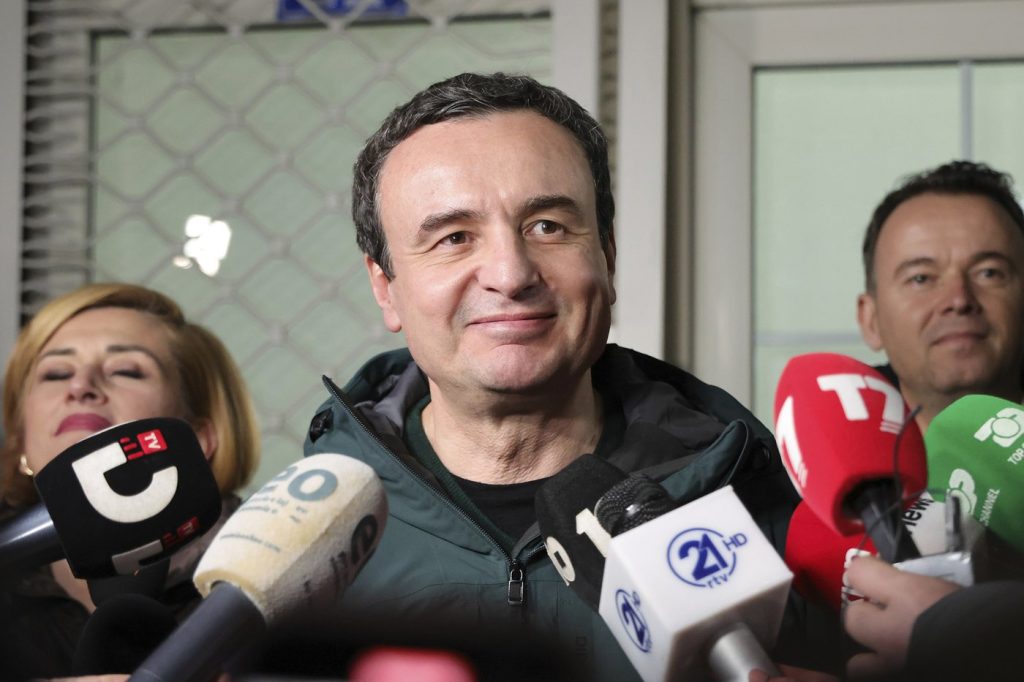PRISTINA, Kosovo (AP) - On Saturday, Kosovo's legislature inaugurated the 120 lawmakers elected to the newly formed Assembly, or Parliament, amidst procedural disputes among political parties. However, the Assembly faced a setback as it failed twice to elect a new speaker, potentially leading the nation into a prolonged legislative crisis.
Following the February 9 election, all parties that secured seats in the parliament voted unanimously in favor of assuming their mandates, paving the way for a vote on the new speaker and deputy speakers. The left-wing Self-Determination Movement, known as Vetevendosje!, led by acting Prime Minister Albin Kurti, captured 48 out of the 120 available seats. This was a decrease from their 2021 performance, where they won 58 seats and indicates that they now lack a majority necessary to elect a new speaker or to independently form a cabinet.
Albulena Haxhiu, Vetevendosje!'s candidate for the speaker position, faced defeat in two consecutive voting rounds, receiving only 57 votes, thus falling short of the 61 required for election in a 120-seat parliament. Parliament is scheduled to reconvene on Monday, but the absence of a speaker raises questions about the procedural structure of the upcoming session. The Constitution does not specify a timeframe for the election of a new speaker, leaving the legislature's immediate future uncertain.
Once a speaker and deputy speakers are elected, Prime Minister Kurti will be officially nominated and will need a simple majority of 61 votes to establish a cabinet. However, Kurti and the three principal opposition parties—the center-right Democratic Party of Kosovo (PDK) with 24 seats, the conservative Democratic League of Kosovo (LDK) with 20 seats, and the right-wing Alliance for Kosovo's Future (AAK) with 8 seats—have all ruled out the possibility of forming a coalition. Additionally, there are ten seats reserved for Kosovo's ethnic Serb minority, with nine of these belonging to the Srpska Lista party, which has direct backing from the Serbian government in Belgrade.
In search of support, Kurti has reached out to ten non-Serb minority MPs and one ethnic Serb lawmaker; however, he still requires at least two additional votes to achieve the necessary majority. Should Kurti fail to assemble a cabinet, the president would then be allowed to consult with any of the remaining parties. If no party can successfully form a cabinet, Kosovo would be compelled to organize fresh parliamentary elections.
The establishment of a new cabinet is vital not just for managing the economy and essential services but also for resuming the long-stalled normalization talks with Serbia, which have lasted 14 years. The backdrop to these developments is the 1998-1999 war, during which around 11,400 people, primarily from Kosovo's ethnic Albanian majority, lost their lives. A 78-day NATO air campaign concluded the conflict and removed Serbian forces from the region. Kosovo declared its independence from Serbia in 2008, a move that has been recognized by most Western nations, although Serbia and its allies, including Russia and China, continue to reject this sovereignty.
The European Union and the United States have emphasized the necessity for both Kosovo and Serbia to implement previously reached agreements, particularly a commitment from Kosovo to establish an Association of Serb-Majority Municipalities while Serbia is expected to provide de facto recognition of Kosovo.










